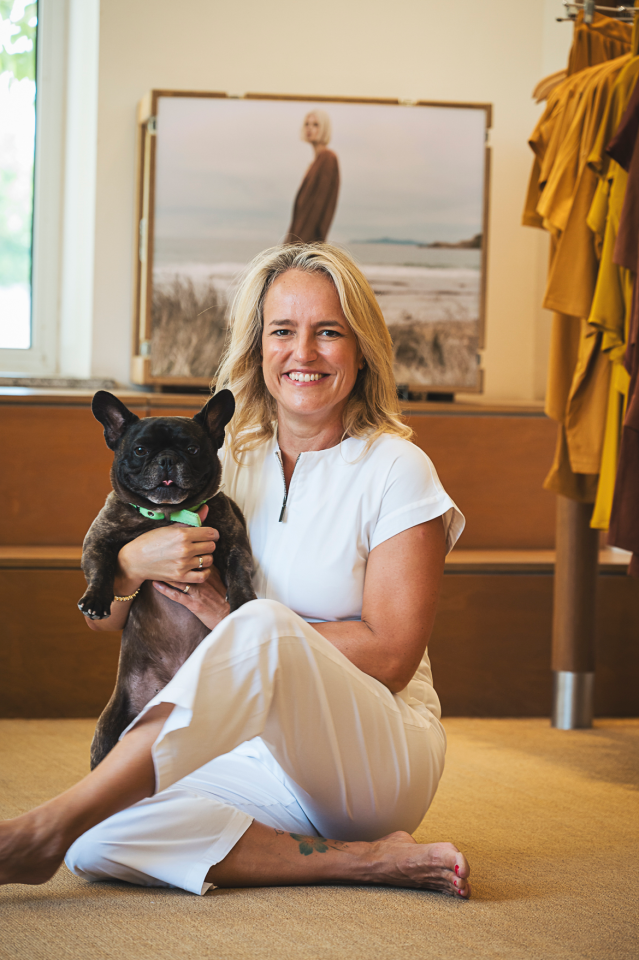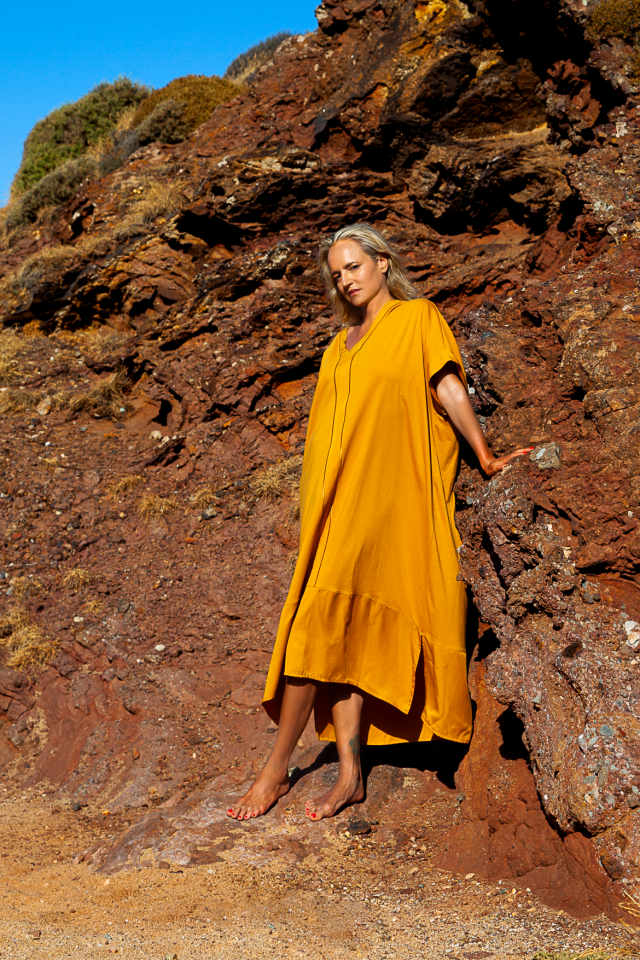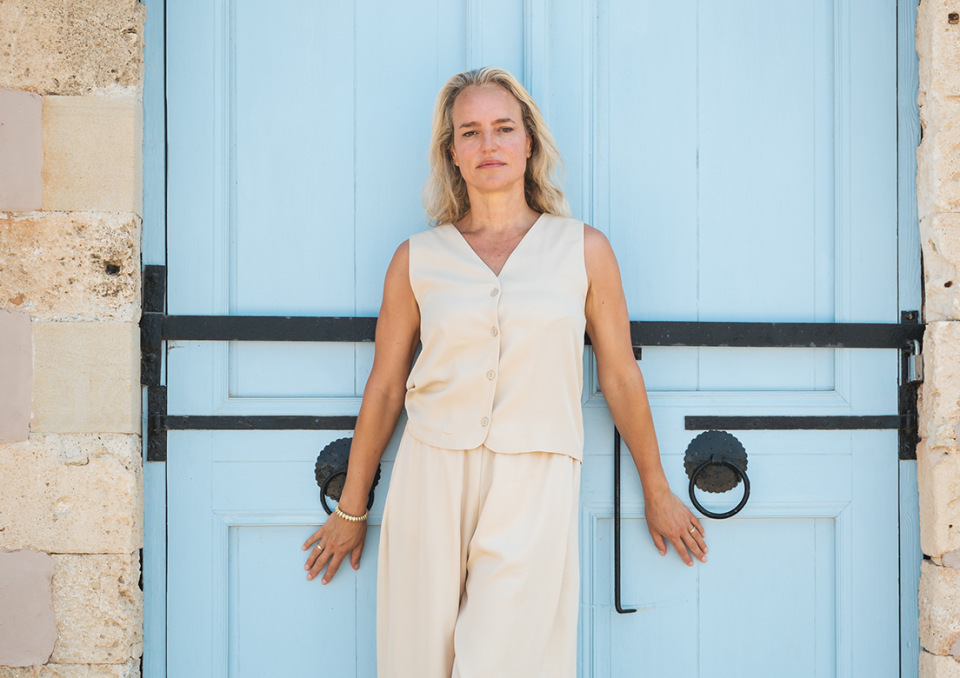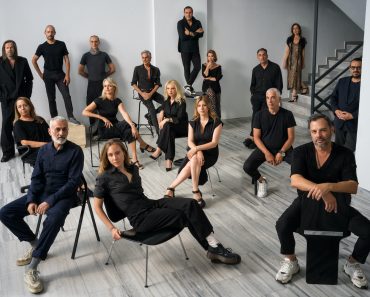Orsalia Parthenis is a Greek fashion designer guided by intention, clarity, and cultural depth. She studied Art History at Brown University in the United States and Dress History at the Courtauld Institute of Art in London, U.K. Early in her career, she worked at Brides magazine under Condé Nast, which gave her an international editorial perspective before returning to Greece. In 1996, she assumed creative leadership of the Parthenis brand. The label designs and produces each collection in Athens, using natural fabrics and clean, versatile forms that reflect a pure, Greek aesthetic. Through her work, Orsalia balances intellectual rigor and quiet craftsmanship, ensuring Parthenis not only endures, but evolves constantly.

Parthenis has become a staple of Greek fashion. How has the brand evolved since its founding in 1970?
Parthenis was born from my parents’ vision in the 1970s—clothing that felt like freedom. Effortless, genderless, honest. Rooted in simplicity, softness, and integrity. I grew up in that universe, surrounded by fabric, form, and philosophy. So when I took over, I never felt the need to reinvent it—only to protect its soul, and let it evolve with me.
I’ve stayed faithful to its essence: minimalism, natural materials, and a quiet sensuality that doesn’t shout, but lingers. The Parthenis philosophy is meant to be felt, not only seen. Our pieces invite you to slow down, to be present in your own skin.
As I’ve grown, so has the brand. It’s become more conscious, more fluid, more attuned to the way we move and live today. The lines have softened, the textures have deepened, the silhouette has opened up—stronger in its softness, bolder in its restraint.
We have always been more than fashion, a way to just be in the world . Gentle but grounded. Clear, but never cold. A kind of lived-in clarity—unapologetically true to itself, and to the people who wear it.
How would you describe the modern Greek style?
Modern Greek style is a beautiful blend of history and contemporary life—deeply rooted in our Mediterranean heritage but open to the world. It’s effortless yet refined, combining simplicity with a natural elegance that feels both timeless and fresh.
There’s a relaxed confidence in how Greeks dress—a respect for quality, craftsmanship, and comfort, paired with a love for natural fabrics and subtle details. True style goes beyond loud trends. It reflects who you are, aligns with the world around you, and honors personal expression, harmony with the environment, all while celebrating the beauty of everyday moments.
For me, modern Greek style is about embracing your roots while moving forward with grace and authenticity.

In what way do global audiences respond to the Parthenis aesthetic, particularly the Greek diaspora in North America?
Parthenis has always had a quiet universality. Its minimalism, comfort, and timelessness speak across cultures. But for the Greek diaspora, especially in North America, there’s something deeper. The aesthetic resonates on an emotional level. It connects the diaspora to their heritage not through clichés, but through a modern, lived-in Greekness that feels authentic and elevated.
They recognize the textures, the ease, the lightness… it reminds them of summers in Greece, of something familiar yet sophisticated. Wearing a Greek brand is more than a fashion choice because it carries a sense of home, identity, and pride in a way that feels contemporary and stylish.
How do you integrate sustainability into your brand’s operations?
For us, sustainability isn’t a trend, it’s a responsibility. It starts with local production. Everything is made in Greece, which allows us to reduce our carbon footprint and support skilled artisans and small workshops we’ve worked with for decades.
We use mostly natural and certified eco-friendly fabrics and we design with longevity in mind. Our pieces aren’t made for one season. They’re meant to last, to be lived in, and loved over time.
Sustainability, for Parthenis, is also about pace. We don’t overproduce. We don’t chase fast fashion. We create thoughtfully, with care—for the planet, for people, and for the body wearing each garment.
You design for both long-time Parthenis customers and new customers discovering the brand for the first time. What’s the key to staying relevant and what excites and inspires you now?
Designing is a deeply personal process. There’s a quiet continuity in our work, as certain shapes, fabrics, and values have become part of people’s lives. I feel a responsibility to honor that trust while also offering something that feels fresh and alive. New customers feel connected to the clothes. There’s a sense of ease, softness, presence at the moment you wear something and feel entirely yourself. That emotional connection is what matters most to me.
Staying relevant isn’t about following trends. It’s about listening, really listening, to the world, to people, to how we move and feel today. I evolve the brand slowly, intentionally. A shift in a line, a new texture, a different rhythm of color. But always with the Parthenis essence at the core—minimalism, clarity, and a deep respect for the body and how it moves through life. What excites me now is designing clothes that hold space for people. Clothes that feel like quiet companions—strong, grounding, intimate. I feel most fulfilled when someone who may have felt overlooked in fashion feels seen, beautiful, and at ease in their body wearing Parthenis. What also inspires me—always—is the soul of Parthenis. Clothing means more than what you wear. It reflects a way of living: quiet, intentional, present. I want everything I do to carry meaning, whether it’s a collection, a conversation, or the way we choose to move forward. To stand for something real. That’s where purpose lives for me.

Breaking into international markets can be difficult for Greek designers, what advice do you have for those who dream of expanding globally?
Expanding globally requires clarity. One has to know exactly who they are and what their brand stands for. Not in a superficial way, but in one’s bones. If you’re not grounded in your own identity, it’s very easy to get lost trying to please different markets. For Greek designers, I think the instinct is often to “translate” our work for an international audience. But the truth is, what makes you distinct is your point of view—your roots, your rhythm, your own aesthetic language. That’s your strength. Don’t dilute it. However a national identity is not the only ticket. Greek designers are often fooled by the success of their designs to international visitors in Greece and are often drawn to a folklore aesthetic.
My advice is to build something solid at home first. Be consistent. Be patient. Invest in your foundation, not just creatively, but technically and strategically. Learn your craft, yes, but also learn how to run a business. Understand production, costing, timelines, margins. Because creativity without structure doesn’t last—and structure without soul doesn’t speak.
Greek fashion deserves more space and more respect on the global stage. We have a rich design culture, skilled craftsmanship, and a unique sensibility that blends heritage with modernity. The world has barely scratched the surface of what Greek creativity can offer. And most of all: don’t chase visibility for its own sake. Create something that carries meaning through time. When something is real, it travels. Maybe not fast—but far.

As president of the Hellenic Fashion Designers Association, what’s at the top of your agenda?
At the top of my agenda is visibility—with depth. Greek fashion has incredible talent, originality, and heritage, but it still doesn’t get the recognition it deserves, especially on an international level. I want to help shift that. Promoting individual designers matters, but the greater purpose lies in building a strong and unified presence for Greek fashion as a whole.
But before we can go out into the world with impact, we need to be seen and supported properly here, at home. And that’s where we’re still lacking. The Greek government continues to overlook fashion as a serious cultural and economic force. Fashion goes beyond aesthetics. It stands as a pillar of culture, drives tourism, and holds real economic potential. It’s about identity, heritage, and how Greece presents itself to the world. And it should be met with that same seriousness in action and policy.
My goal is to advocate for that recognition. We need investment in infrastructure, education, production, and promotion that supports more than a handful of names and helps create a healthy ecosystem where talent can thrive, here in Greece.
Ultimately, I want Greek fashion to stand confidently on its own terms by embracing and elevating what makes our voice unique, rather than mimicking global trends.
My role is to open doors and to insist they remain open for the future of Greek fashion as both an art form and a national asset.
See the Parthenis SS25 Collection “Metamorphoses” at https://orsalia-parthenis.gr/






